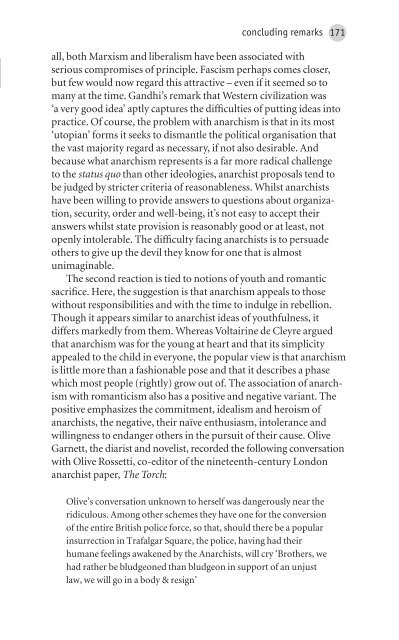o_195qg5dto17o4rbc85q1ge61i84a.pdf
Create successful ePaper yourself
Turn your PDF publications into a flip-book with our unique Google optimized e-Paper software.
concluding remarks 171<br />
all, both Marxism and liberalism have been associated with<br />
serious compromises of principle. Fascism perhaps comes closer,<br />
but few would now regard this attractive – even if it seemed so to<br />
many at the time. Gandhi’s remark that Western civilization was<br />
‘a very good idea’ aptly captures the difficulties of putting ideas into<br />
practice. Of course, the problem with anarchism is that in its most<br />
‘utopian’ forms it seeks to dismantle the political organisation that<br />
the vast majority regard as necessary, if not also desirable. And<br />
because what anarchism represents is a far more radical challenge<br />
to the status quo than other ideologies, anarchist proposals tend to<br />
be judged by stricter criteria of reasonableness. Whilst anarchists<br />
have been willing to provide answers to questions about organization,<br />
security, order and well-being, it’s not easy to accept their<br />
answers whilst state provision is reasonably good or at least, not<br />
openly intolerable. The difficulty facing anarchists is to persuade<br />
others to give up the devil they know for one that is almost<br />
unimaginable.<br />
The second reaction is tied to notions of youth and romantic<br />
sacrifice. Here, the suggestion is that anarchism appeals to those<br />
without responsibilities and with the time to indulge in rebellion.<br />
Though it appears similar to anarchist ideas of youthfulness, it<br />
differs markedly from them. Whereas Voltairine de Cleyre argued<br />
that anarchism was for the young at heart and that its simplicity<br />
appealed to the child in everyone, the popular view is that anarchism<br />
is little more than a fashionable pose and that it describes a phase<br />
which most people (rightly) grow out of. The association of anarchism<br />
with romanticism also has a positive and negative variant. The<br />
positive emphasizes the commitment, idealism and heroism of<br />
anarchists, the negative, their naïve enthusiasm, intolerance and<br />
willingness to endanger others in the pursuit of their cause. Olive<br />
Garnett, the diarist and novelist, recorded the following conversation<br />
with Olive Rossetti, co-editor of the nineteenth-century London<br />
anarchist paper, The Torch:<br />
Olive’s conversation unknown to herself was dangerously near the<br />
ridiculous. Among other schemes they have one for the conversion<br />
of the entire British police force, so that, should there be a popular<br />
insurrection in Trafalgar Square, the police, having had their<br />
humane feelings awakened by the Anarchists, will cry ‘Brothers, we<br />
had rather be bludgeoned than bludgeon in support of an unjust<br />
law, we will go in a body & resign’




